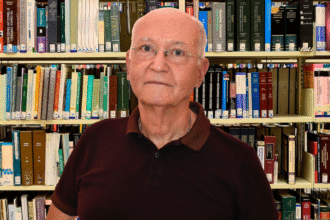Through the work “D. and the Procurator”, author Fauno Mendonça delves into an unexplored universe of vampire narrative, bringing to light an engaging plot that goes beyond the famous story of Dracula. In this unprecedented plot, readers are led through a journey full of mysteries, reflections and adventures that reveal new perspectives on one of the greatest icons of world literature.
The book takes an in-depth look at the Transylvanian count’s past, exploring his innermost thoughts, his former love, and his experiences in the Order of the Dragon. However, the role is not limited to just the vampire, as prosecutor Connor Burke also plays a central role in the plot, offering the reader a broader view of the contexts of the Victorian era and nationalist dilemmas.
As Connor travels to Dracula’s castle to account for the properties he has acquired, he finds himself drawn into a web of mysteries and challenges. Alternating between first- and third-person narratives, the book delves into the psychological depths of the characters while exploring the political, social, and economic cultures and conflicts of late 19th-century Europe.
“D. and the Prosecutor” not only expands the universe of Dracula, but also delves into timeless dilemmas of nations and human complexities, offering readers a literary experience rich in suspense, reflection and adventure.
How did the inspiration to write “D. and the Prosecutor” and explore an unprecedented perspective on the famous character of Dracula?
Anyone who has read Bram Stoker’s “Dracula” knows that there are some characters that are part of the narrative without there having been a more detailed explanation about their appearances. Obviously, this is not the rule, as the book is magnificently well written in an epistolary way, leaving no doubt about its characters. In any case, I wanted, within the world of fiction, to give more life not only to Count Dracula, but to other characters that orbited around him. Thus, when writing “D. and the Prosecutor”, I narrated a story before the events that occurred in Bram Stoker’s book so that the reader becomes more lucid about the world that surrounds the Carpathian Vampire. In this overview, I focused on Dracula’s preparations to head to Victorian England, explaining his purpose, in addition to inserting intimate aspects, involving the main characters of the book.
What was the research process like to accurately portray the Victorian era and the political, social and cultural contexts of 19th century Europe?
It’s important to say that I’m not a historian, so I don’t know if I’ve described the “Victorian Era” accurately. I tried to keep the topic superficial so as not to make mistakes. When studying that period that influenced the world, I looked for reliable sources that indicated what the historical perspective was like at the end of the 19th century in England and the rest of Europe.
I emphasize, however, that the assessments contained in my work regarding sensitive themes from that historical period are not things that are simple to understand, on the contrary. Therefore, the reader must have a critical sense when reading the novel, especially because it is a work of fiction. I did not and do not intend to affirm that the truth is contained in the pages of my book.
The book alternates between first and third person narratives. What was the reason behind this choice and how does it contribute to the characters’ development?
In Bram Stoker’s work, Dracula is an extremely proud creature, in addition, he was an important nobleman and was part of a family that dominated part of Eastern Europe. Therefore, obviously, he maintained the inherent pride of a 15th century nobleman.
Given this context, I left Dracula’s narrative in the first person so that his worldview and intention to go to England would not suffer interference from third parties. He himself needed to tell his story to demonstrate his timeless pain and conflicts.
You mentioned that Dracula has a human side and that the main character, Connor Burke, is searching for meaning in life. How are these themes addressed throughout the plot?
Dracula turned into a monster, because his human side was very exacerbated. These intense feelings are also common to ordinary people. In this sense, it became a myth, because the myth is not created, it only acquires a representation of something that already existed. Dracula personified this myth of fervent feelings. Despite being supported by his natural violence and bloodlust, people identify with the story of that being who sought immortal love and the defense of his country and its values at any cost.
In relation to the character Connor Burke, despite being a socially and economically successful man, there was a great void that prevented him from knowing what his role was in this world. This caused him a deep discomfort that needed to be dispelled at any cost, even if his life was in danger.

In addition to exploring psychological aspects of the characters, you highlight local cultures and political, social and economic problems. How do these elements enrich the narrative?
Prosecutor Connor Burke’s questions really focus on these aspects, given his exalted desire to understand what was happening around him. On the other hand, Dracula also plays a fundamental role in all these circumstances, as he was a very rich creature in Eastern Europe, and this had repercussions on the culture, political, social and economic problems in the region where he lived.
In the book, I also highlighted the submission of the culture of an industrial Europe to the detriment of another Europe that remained forgotten over time, in addition to delving into the strength of the British Empire in the face of Ireland, which did not accept being subjugated by England.
“D. and the Procurator” reflects on timeless dilemmas of nations and human contradictions. How did you balance the gothic atmosphere fiction with these broader themes?
These dilemmas, as stated in your question, are timeless, have always existed and will continue to exist as long as there is life on Earth. In this naturally tumultuous environment, when not finding plausible answers with the aim of guaranteeing comfort and security, people seek the mysterious side, the not understood side of dreams, death, madness, religion, Satanism and fantasy, etc. , exposing a gothic world to find answers to get rid of the vile face of life that causes them so much affliction.
What was the biggest challenge in writing this book and how did you overcome it?
The biggest challenge was maintaining Bram Stoker’s originality when writing “Dracula”. I did not want to detract from this great character in any way. However, whether I managed to overcome this challenge, I cannot say, whoever will say will be the reader of my book and connoisseur of the Irish writer’s work.
How did your law training and professional experience influence your writing?
Law writing is very technical and tough, it must follow rigid and concise standards, there is no room for digressions. However, I think that the writing I developed doing legal pieces helped me a lot. Writing is an arduous task that requires knowledge of the language and a lot of attention. I think that at this point, my profession gave me the space to move forward on the path of writing in the field of fiction.
You have published other books previously. How D. and the Prosecutor”; Does it differ from your previous works?
In reality, all my works are focused on intimacy. I explore psychological, spiritual, metaphysical and material conflicts, among many other human dilemmas. “D. and Procurator” is also an intimate novel like the other books. However, the big difference is the narrative based on a book already written.
You mentioned that “Find Yourself” is available in audiobook format. How do you see the importance of audiobooks in the current literary market?
I think that audiobooks are another way of disseminating literature, and currently this segment has grown a lot. This is not a mere wave, I think it tends to evolve, above all, in the quality of sound design and, consequently, in sales. Anyone who listens to an audiobook will be able to discover the pleasure of reading. There are no emulations between reading and the audiobook, because they can go hand in hand. All forms of disseminating literature are valid, as literature adds knowledge and forces people to have a critical view of the world and themselves. As I always say: Literature reveals life!
Follow Fauno Mendonça on Instagram





